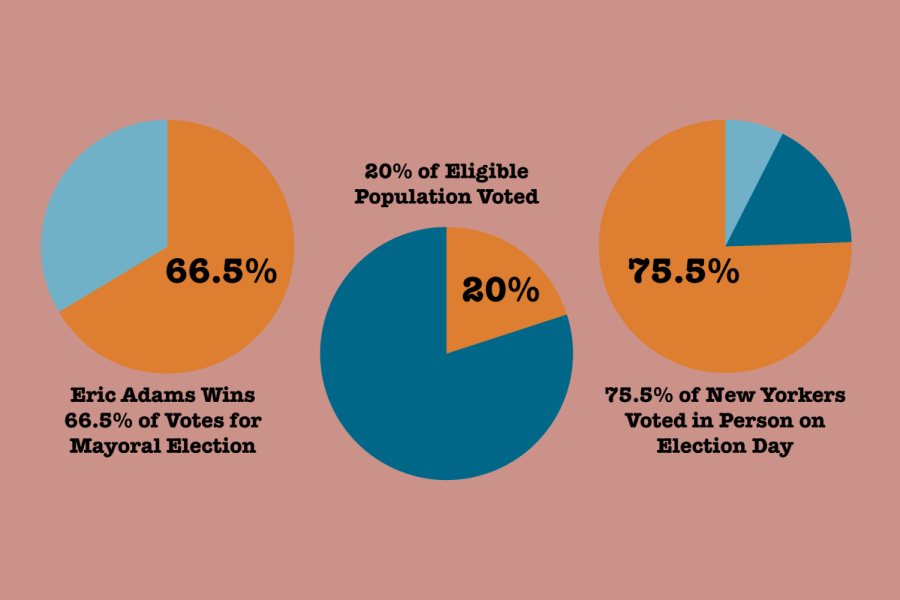A Reflection on the 2021 NYC Mayoral Election
The 2021 NYC mayoral election yielded almost 100,000 fewer votes than the 2017 election
November 23, 2021
After the NYC election on Nov. 2, Eric Adams won the mayoral race with a reported 66.5% of the vote count. Only 20% of the eligible voting population participated this year.
The vote count for all five boroughs of NYC totaled 1,016,663 votes. About 79,000 of those bnvotes were absentee ballots and an additional 170,000 came from the early in-person voting period between Oct. 23 and 31.
In the mayoral election of 2017, Bill de Blasio took the lead representing the Democratic Party by winning 66.2% of the votes; Republican runner-up Nicole Malliotakis earned 27.8%. In the 2017 mayoral election, 1,166,314 people casted votes, which was 23% of the eligible voting population.
With a new mayor, NYC could experience changes in policy relating to homelessness and other city issues.
Although Adams received the majority of votes in almost every borough, Staten Island was the outlier, with 68% voting in favor of Curtis Sliwa, the Republican candidate. The 2017 electoral results were similar to 2021. Republican candidate Malliotakis was favored by 70.8% of voters in Staten Island.
With a new mayor, NYC could experience changes in policy relating to homelessness and other city issues under Adams’ tenure. Almost half of the undergraduate population at Fordham Lincoln Center are commuters, which means new policies will influence these students and their families’ lives — as well as resident students.
Omi Mehta, Gabelli School of Business at Lincoln Center ’25 and a resident, noted how she was “extremely happy” that Adams won the electoral election, mentioning that “he is very qualified and has a strong background in politics.”
The election is already influencing NYC politics.
Mehta explained that because Adams’ values are associated with the Democratic Party, she looks forward to seeing what impacts his decisions have on NYC.
Sophia Zanga, Fordham College at Lincoln Center ’25 and a resident, spoke about how she “did not know much about Adams and his win,” detailing how she felt that since many students are ineligible to vote in NYC, “they mainly focus on the election in their hometown.”
Although voter turnout for the mayoral election was low, the election is already influencing NYC politics.
Adams has already begun unique administrative choices, such as his appointment of Stephen Scherr, a Goldman Sachs financial officer, one of the multiple businessmen in Adams’ staff thus far.
The approval rate of outgoing de Blasio is currently 37%, and there was a clear drop from a rating of 45% in April 2021, which represents city residents’ negative perception of the mayoral office.
While Adams continues to choose mayoral staff and elects a new NYPD commissioner, it remains to be seen whether Adams will carry out his campaign proposals.














